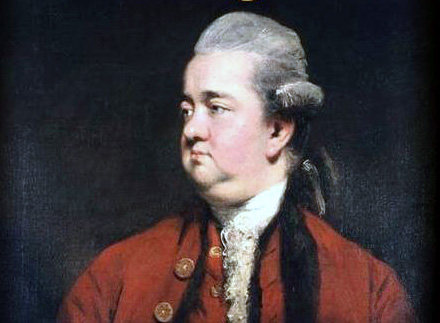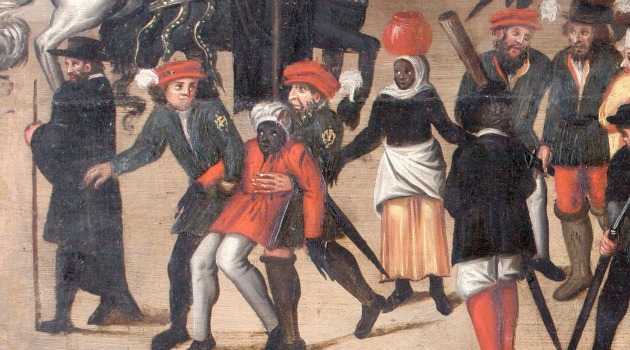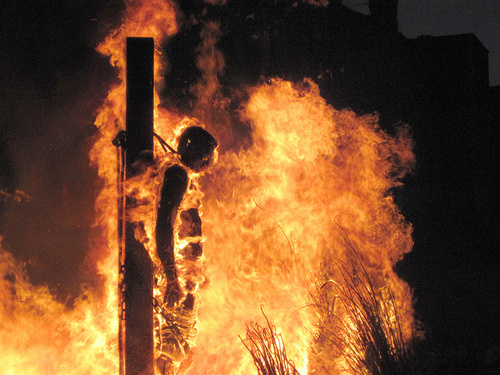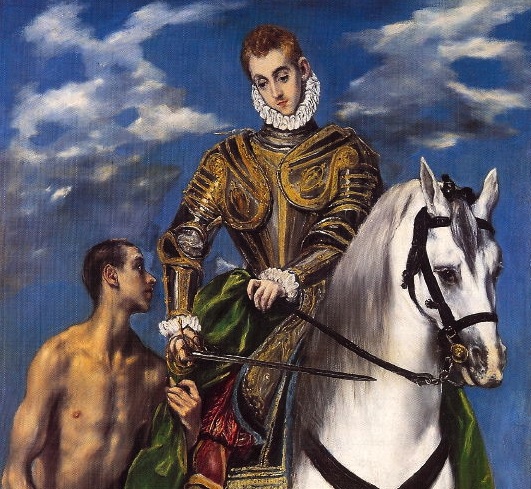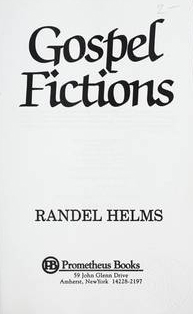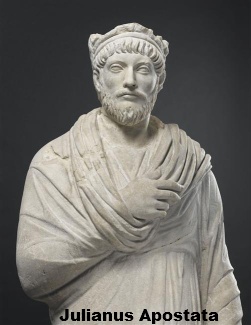
Excerpted from
March of the Titans:
A History of the White Race
by Arthur Kemp:
The saga of the European Jews
Anti-Semitism—or, more accurately, anti-Jewishness—was not an invention of Hitler nor of his National Socialist German Workers’ Party. Anti-Jewish sentiment has always stalked the Jews, where-ever they went: it seems as if their very presence always elicited a negative and hostile response from virtually all the nations in which they settled. Anti-Jewish sentiment existed long before Christianity, and the introduction of that religion and its distortions merely provided another means of expression for the latent anti-Jewish feeling which always followed the Jews like a shadow.
Origins of anti-Jewish sentiment. The origins of this original anti-Jewish feeling lie within the nature of Jewish society itself: exclusively ethno-centric with a binding religion and inward looking culture, the Jews always managed to maintain themselves as an isolated community in all of the nations in which they settled. This tradition has maintained itself to this day.
For this reason, Jews tended to live together in tightly knit communities in cities: these Jewish blocks came to be called ghettoes, and it is important to realize that the first ghettoes were entirely voluntary Jewish neighborhoods. This was then re-inforced by religious laws limiting membership of the Jewish community by race—only people born of Jewish women could be accepted as Jews. This is another practice which has survived to the present day—people of no direct Jewish ancestry can only become Jews with great difficulty, and even then a large section of the Jewish community, the orthodox Jews, will not recognize converts as true Jews.
Finally, the well-known Jewish propensity for business and the ability to accumulate vast amounts of money—a phenomena well known to this day—was the source of much original anti-Jewish feeling. Gentiles (or, Goy as the Jewish Talmud) refer to non-Jews of all races, with the literal translation of cattle—which in itself is an important insight of how the writers of the Talmud viewed the outside world.
The true origins of anti-Jewish feeling therefore lies in a combination of three major factors:
• the self imposed isolation of the Jewish people;
• the open hostility to Non-Jews as espoused in their ethno-centric and tightly binding religion; and
• the propensity of their financial dealings.
Thus it was that the first anti-Jewish outbursts occurred long before the introduction of Christianity. Christianity merely added to these emotions: as the wave of Christian fanaticism swept Europe, all sense of reason or rationality was lost, and, forgetting that Christianity itself had sprung from Judaism, the Christians gave vent to their long simmering dislike of the Jews by accusing them of being the killers of Christ to boot.
The hostility was however, reciprocated: the Talmud, which is a collection of rabbinical writings added to the Old Testament, contains many violently anti-Gentile remarks, comparing non-Jewish women to whores and providing specific instruction on how it is permissible for Jews to cheat non-Jews in business.
Both Christians and Jews then, altered their religious teachings in attempts to whip up hostility to each other in a bizarre semi-religious and semi-racial clash.
Jews occupy high posts in Moorish Spain and Portugal. After the decline of the Roman Empire, Jews started settling in larger numbers in Western Europe, with many Sephardic Jews crossing over from Africa into Spain. Hot on their heels came the Muslim Moors, who gave the Jews favored status in Moorish occupied Spain: Jews came to fill the highest position in the Moorish republic of Granada in Spain and owned one-third of all the real estate in Barcelona.
When the Moorish occupation of Spain was finally ended, the Christian victors did not take kindly to what they correctly saw as Jewish collaboration with the Moors. This led to the Spanish version of the inquisition, which was primarily aimed at Jews who had falsely converted to Christianity in an attempt to escape the revenge attacks on Jews carried out by the victorious Christian armies. Finally, the Jews were formally expelled from Spain in 1492, the same year that Christopher Columbus set foot in the Americas.
France. As avid supporters of the French Revolution, Jews were rewarded when the National Assembly enfranchised Jews in 1791, simultaneously stripping all restrictions which had been placed on them.
Napoleon Bonaparte was given much support by Europe’s Jews in his campaigns across Europe, for where ever he went he lifted whatever restrictions there had been upon the Jews. Once again, this was only good for Jews over the short term. The downside came when Napoleon was finally beaten: Jews were associated with the destruction that his military adventures had wrought; virtually all of the reforms he had instituted were reversed as a result.
However, by the 1860s, most of the Jewish communities in Western Europe had more or less been de-ghettoized, and Napoleon’s reforms had for the greatest part been re-instituted.
Jewish domination of media in the West. Whether by deliberate plan or accident, the situation has arisen whereby Jews have ended up dominating the mass media forms of both the USA, and to a slightly smaller extent, of Western Europe. The ownership of the mass media by a small group of Jews is well documented and full details are easily obtainable on the Internet.
This Jewish domination of the media can, and does, have serious consequences, so vividly illustrated by the 11 September 2001 attacks on New York’s World Trade Centre and the Pentagon in Washington, D.C. These events were triggered exclusively by the unflagging US support given to Israel against the Palestinians.
The fact that the USA—and much of the West—continues to support Israel at any cost, including the deaths of thousands of its own citizens, is the surest evidence yet of the power of the Jewish lobby in both the mass media (which generates “public opinion”) and of the Jewish lobby’s famed control over the US government, and to a lesser extent, the governments of Western Europe.
The expulsion of the Jews
The Spanish Jews were amongst the first to feel the full effects of the fall of the Moors from power in Spain. In 1492 Isabella and Ferdinand formally expelled all Jews from that country, punishing the Spanish Jews for having actively collaborated with the Moors during their 780 year long occupation. The victorious Moors (who, because of their common Semitic ancestry with the Spanish Jews and the already poor relations between the Jews and the Goths) employed several Spanish Jews in their administration of Spain in some of the highest posts, even though there were occasional outbursts of anti-Jewish feeling amongst the Arabs themselves.
In the city of Grenada, the last to fall to the White armies, the Spanish were enraged to learn that the Moorish king’s prime minister and most of his leading advisors were Jews. A massacre of Jews in the city followed that discovery. This alliance between a number of Spanish Jews and the Moors inflamed the anti-Semitic feeling amongst the subdued Goths even further; a sentiment which would later flare up in the form of the Spanish Inquisition and the expulsion of the Jews from Spain.
The Inquisition. When Spain was finally liberated from the non-White Moors, the long suppressed anti-Jewish sentiment broke out in full fury. In that year all unbaptized Jews were expelled en masse from Spain, and the infamous Spanish Inquisition, set up to enforce Christendom, was used to persecute Jews, who, because of their collaboration with the Moors, were regarded as the implacable enemies of White Spain.
Earlier Isabella had obtained from the Pope in Rome a dispensation to establish the Inquisition in Spain, which soon turned into a fully fledged anti-Jewish campaign under the name of Christianity. The first hearings against the Conversos were held in February 1481 in Castile; it combined with the outbreak of the bubonic plague. Many Christian fanatics linked the outbreak of the plague to the start of proceedings against the Conversos, and the Jews were blamed for the plague as well as their other real or imagined crimes, which included accusations that they had betrayed the city of Toledo to the invading Moors by opening the city gates at a crucial junction in the siege of that city.
The leading Conversos held a secret meeting to resist the Inquisition with force. Isabella’s spies however found out about the planned rebellion and arrested the ringleaders, most prominent amongst them a rabbi named Diego de Susan. He, along with six other Jews, was tried for subversion, found guilty and executed by burning at the stake in late 1481.
The Conversos then broke rank in panic, and starting fleeing Spain in large numbers, some going to Italy, but many going to Muslim held Turkey, where they once again enjoyed special status. Much property belonging to the Converso Jews—who by some estimates made up as much as 20 per cent of Spain’s pre-Inquisition population—was seized by Isabella and added to the state treasury.
After the expulsion of the Moors and the Jews, Spain entered its Golden Age. It created a huge empire, and along with Portugal, became one of the most powerful nations in Europe.
The First Great Brothers’ War
The World Zionist movement, a nationalist Jewish organization founded by European Jews to create a national homeland for Jews in Palestine, saw an opportunity open up with the British occupation of Palestine, and persuaded the British foreign minister, Lord Arthur Balfour, to issue a public promise in 1917 to the effect that Britain would support the creation of a Jewish homeland in Palestine. This public promise became known as the Balfour Declaration.
In return for this undertaking, the World Zionist Movement then promised Britain that it would marshal the world’s Jews behind the Allied cause and, more importantly, endeavor to use their influence to bring the United States of America into the war. In this way, considerable pressure was brought to bear on the American government to enter the war against Germany, although by this stage they hardly needed much prompting.
The United States enters the war. While the World Zionist Congress was actively working behind the scenes with the powerful Jewish lobby in the American government, the course of the war at sea presented the American president, Woodrow Wilson, with an opportunity to enter the war against Germany, despite his presidential election campaign having been specifically fought on a non-interventionist ticket.
In February 1917, the US broke off diplomatic relations with Germany and formally declared war in April. The timing of the US entry into the war—virtually simultaneously with the Balfour Declaration—is too good to be coincidental. By June 1917, more than 175,000 American troops were already in France; by the end of the war more than two million Americans had been deployed in France.
Waves of fresh American troops captured 14,000 exhausted and virtually starving German troops at Saint-Mihiel, and then pushed on through the Argonne forest, breaking the German lines between Metz and Sedan.
With this major defeat, the German government asked for an armistice in October 1918—this attempt to end the war failed when the American president Woodrow Wilson insisted on negotiating only with a democratic German government. The British then pushed home an attack in Belgium and Northern France and early in November American and French forces reached Sedan. By early November, the Hindenburg line had been broken and the Germans were in disarray.
The suppressed link – Jews and communism
The creation of the Soviet Union was to impact upon history for the greater part of the 20th Century—and an understanding of the sub-racial and ideological divisions it caused is crucial to understanding not only the events of that century, but also to understanding the flare up of anti-Jewish sentiment which culminated in the creation of the Third Reich in Germany.
For the Soviet Union’s best kept secret was that the Bolshevik elite had one outstanding characteristic: it had an inordinately large number of Jews in its controlling body.
Virtually all of the important Bolshevik leaders were Jews: they included the “father of the revolution,” Leon Trotsky (whose real name was Lev Bronstein: in an attempt to hide his Jewishness, he adopted the name Trotsky); Lev Kamenev, the early Bolshevik leader who later went on to become a leading member of the Politburo, was born with the surname Rosenfeld; Grigori Zinoviev, head of the Petrograd Soviet, was born with the surname Apfelbaum; and many other famous Communists of the time, such as Karl Radek, Lazar Kaganovich; and Moses Urtisky, (the head of the Cheka) who all changed their names for reasons similar to that of Trotsky.
The Bolshevik’s Party’s Central Committee chairman, Yakov Sverdlov, was also Jewish—and it was he who gave the order to the Jewish Soviet secret policeman, Yurovsky, to murder the Tsar—Yurovsky personally carried out this order.
As if the Russian Revolution was not enough, the originator of the Communist ideology itself, Karl Marx, was also a Jew, with his family name in reality being Levi.
The large Jewish role in the Russian revolution, combined with the fact that Marx had been born a Jew, was manna from heaven for the European anti-Semitic movement, and the link between Jews and Communism was exploited to the hilt, particularly by Adolf Hitler and the National Socialist (Nazi) movement in Germany during the 1920s.
It was not only in Germany that the association of Jews with Communism was made: all over the world Jews became associated with radical political movements, sometimes justifiably so, other times not. Nonetheless, the presence of so many Jews in the creation of the Soviet Union played a massive role in justifying anti-Jewish sentiment in Europe prior to, and with, the rise of Adolf Hitler.
Directly after the First World War, there were another three specifically Jewish Communist revolutions in Europe itself:
• the German Jew, Kurt Eisner, led a short lived communist revolution in Munich, Bavaria from November 1918 to February 1919 (at the same time that Adolf Hitler was an unknown soldier in that city—the effect of being a first hand witness to a Jewish and Communist-led revolution helped to cement Hitler’s anti-Communist and anti-Jewish feelings);
• the short lived Sparticus uprising in Berlin (September 1918 to January 1919) led by the German Jews, Karl Liebknecht and Rosa Luxemburg; and
• the short lived Communist tyranny in Hungary led by the Jew, Bela Kun (Cohen), from March to August 1919.
These incidents all helped to identify Jews with Communism in the public mind: in this light it becomes perfectly explicable why the Nazi Party was able to win support on an anti-Communist and open anti-Jewish platform.
Jews in the later Soviet Union. Jews retained their leading roles in Soviet society until growing anti-Semitism within the Communist Party itself led to a change in policy. Trotsky was the first major Jewish casualty: he split with Stalin over the issue of international socialism and the need to spread the revolution: he was forced into exile in 1929. He was then assassinated in Mexico City in 1940, allegedly by a Stalinist agent.
By the middle 1930s, Stalin had started purging the Soviet Communist Party of other important Jews. The period immediately following the end of the Second World War and the creation of the state of Israel saw another rise in Soviet anti-Semitism: by 1953, Stalin had started purging all Jews in the Soviet hierarchy who were also Zionists.
The Communists, quite correctly, saw Zionism as Jewish nationalism and contrary to the interests of an international socialist brotherhood. Many leading Russian Jews were also fervent Zionists: and it was this group that was then targeted for persecution, and who became famous throughout the rest of the lifetime of the Soviet Union as the victims of Soviet anti-Semitism.
Zionism, as an expression of Jewish separatism was declared a crime against the Soviet state, and Zionist organizations were forced to close down their operations inside the Soviet Union. East Germany, as an official Soviet satellite, was forbidden by Moscow to make any reparations payments to the Zionist created state of Israel for the treatment of Jews by the Nazi government.
Not all Russian Jews were Zionists: those who were not, were generally left alone and some did achieve prominent positions within the post Stalin Soviet Union. Many thousands of Jews did however leave the Soviet Union—estimates putting the total number at over the one million mark, with most settling in Israel or the United States.
The Encyclopedia Judaica, published in Jerusalem, Israel, by Jews, is available at most large public libraries and is in English. This reference book for all things Jewish is quite open about the Jewish role in Communism, particularly early Communism, and contains a large number of admissions in this regard.

The Volume 5 of the 1971 edition of the
Encyclopedia Judaica, published in Jerusalem, Israel,
from where all of the extracts below have been taken.
Under the entry for “Communism”: in Volume 5, page 792, the following appears: “The Communist Movement and ideology played an important part in Jewish life, particularly in the 1920s, 1930s and during and after World War II.” On page 793, the same Encyclopedia Judaica then goes on to say that “Communist trends became widespread in virtually all Jewish communities. In some countries, Jews became the leading element in the legal and illegal Communist Parties.”
The Encyclopedia Judaica goes on to reveal that the Communist International actually instructed Jews to change their names so as “not confirm right-wing propaganda that presented Communism as an alien, Jewish conspiracy.”
The Encyclopedia Judaica then goes on to describe the overwhelming role Jews played in creating the Soviet Union. On page 792 it says: “Individual Jews played an important role in the early stages of Bolshevism and the Soviet Regime”.
On page 794, this Jewish reference book then goes to list the Jews prominent in the upper command of the Russian Communist party: these included Maxim Litvinov (later foreign minister of Soviet Russia); Grigori Zinoviev, Lwev Kamenev, Jacob Sverdlov, Lazar Kaganovich, and Karl Radek, amongst many others.
The organizer of the Revolution was Trotsky, who prepared a special committee to plan and prepare the coup which brought the Communists to power. According to the Encyclopedia Judaica, this committee, called the Military Revolutionary Committee, had five members—three of whom were Jews. The Politburo—the supreme governing body of Russia immediately after the Communist Revolution—had four Jews amongst its seven members, according to page 797 of the Jewish Encyclopedia Judaica.
While many have alleged that Lenin was also Jewish, or at least of part Jewish origin, there is little concrete evidence of this. However, Lenin was ardently pro-Jewish, branding anti-Semitism (correctly) as “counter revolutionary” (Encyclopedia Judaica, page 798). A statement against anti-Semitism was made by Lenin in March 1919 and was “one of the rare occasions when his voice was put on a phonograph record to be used in a mass campaign against the counterrevolutionary incitement against the Jews,” according to the Encyclopedia Judaica, page 798. One of the first laws passed by the new Soviet Communist government was to outlaw anti-Semitism (Encyclopedia Judaica, page 798).
Winston Churchill on the Jewish role in communism. The preponderance of Jews in the inner sanctum of the Communist revolution in Russia was in fact well known at the time that the revolution took place: it is only in the post Second World War II era that this fact has been suppressed.
A good example of the contemporary awareness of the Jewish nature of early Russian Communism can be found in the writing of the young Winston Churchill, later to become prime minister of Great Britain, who, in 1920, was also working as journalist.
In 1920, Churchill wrote a full page article for the Illustrated Sunday Herald on 8 February 1920 detailing the Jewish involvement in the revolution. Churchill discusses in this article the split between Jews: some are Communists, he wrote, while others are Jewish nationalists. Churchill favored the Jewish nationalists, (and of course they indeed fall foul of the Jewish Communists, eventually becoming bitter enemies) and he appealed to what he called “loyal Jews” to ensure that the Communist Jews did not succeed. Churchill went even further and blamed the Jews for “every subversive movement during the Nineteenth Century”, writing:
This movement amongst the Jews (the Russian Revolution) is not new. From the days of Spartacus Weishaupt to those of Karl Marx, and down to Trotsky (Russia), Bela Kuhn (Hungary), Rosa Luxembourg (Germany) and Emma Goldman (United States), this world wide conspiracy for the overthrow of civilization and the reconstruction of society on the basis of arrested development, of envious malevolence, and impossible equality, has been steadily growing. It played, as a modern writer, Mrs. Nesta Webster, has so ably shown, a definitely recognizable part in the tragedy of the French Revolution.
It has been the mainspring of every subversive movement during the Nineteenth Century; and now at last this band of extraordinary personalities has gripped the Russian people by the hair of their heads and have become practically the undisputed masters of that enormous empire. There is no need to exaggerate the part played in the creation of Bolshevism and in the actual bringing about of the Russian Revolution by these international and for the most part atheistic Jews. Moreover, the principal inspiration and driving power comes from Jewish leaders.
Churchill also pointedly accused Leon Trotsky (Bronstein) of wanting to establish a “world wide Communistic state under Jewish domination” in this article.
Churchill was not the only journalist to note the Jewish role in the Russian Revolution: Robert Wilton, the chief correspondent for the London Times, who was stationed in Russia at the time, wrote in his book The Last Days of the Romanovs (Hornton Butterworth, London, 1920, pages 147, 22-28, 81,118, 199, 127, 139-148) that “90 per cent” of the new Soviet government was composed of Jews. The correspondent for the London Morning Post, Victor Marsden, went further and actually compiled a list of names of the top 545 Bolshevik officials: of these, Marsden said, 454 were Jews and only 23 Non-Jewish Russians (All These Things, A.N. Field, Appendix B pages 274-276).
The US Army’s telegrams . The American Army Intelligence Service had its agents in Russia at the time of the Communist Revolution, and the Jewish nature of that revolution is accurately reflected in those reports.
An American Senate subcommittee investigation into the Russian Revolution heard evidence, put on congressional record, that “In December 1919, under the presidency of a man named Apfelbaum (Zinovieff), out of the 388 members of the Bolshevik central government, only 16 happened to be real Russians, and all the rest (with the exception of a Negro from the U.S.) were Jews” (U.S. Senate Document 62, 1919).
[Kemp includes here photocopy images of these telegrams from official US National Archives, and then he adds:]
Both describe the domination of the Bolshevik Communists by Jews, using the words “Fifty per cent of Soviet Government in each town consists of Jews of the worst type.”
Copies of documents from the US National Archives are freely available to anyone from the Washington DC, USA, office.
However, none of these authorities quoted above dared to use quite the language of a US Military Intelligence officer, one captain Montgomery Schuyler, who sent two reports to Washington in March and June 1919, describing in graphic detail the Jewish role in the Russian Revolution. Both these reports were only declassified in September 1957 and the originals are still held in the US National Archives in Washington, open for public inspection.
The first report, sent from Omsk on 1 March 1919, contains the following paragraph: “it is probably unwise to say this loudly in the United States but the Bolshevik movement is and has been since its beginning, guided and controlled by Russian Jews of the greasiest type”.
The second report, dated 9 June 1919, and sent from Vladivostok, said that of the “384 commissars there were 2 Negroes, 13 Russians, 15 Chinamen, 22 Armenians and more than 300 Jews. Of the latter number 264 had come to Russia from the United States since the downfall of the Imperial Government.”
Both these American army military intelligence reports are freely available from the US National Archives in Washington DC. The importance of this information does not need to be overemphasized in the light of the crucial governing role the commissars played in the running the early Soviet society.
It therefore came as no surprise when anti-Semitism was duly entered into the Soviet law books as a death penalty crime.
Note:
For excerpts of all chapters of Kemp’s book see: here.
